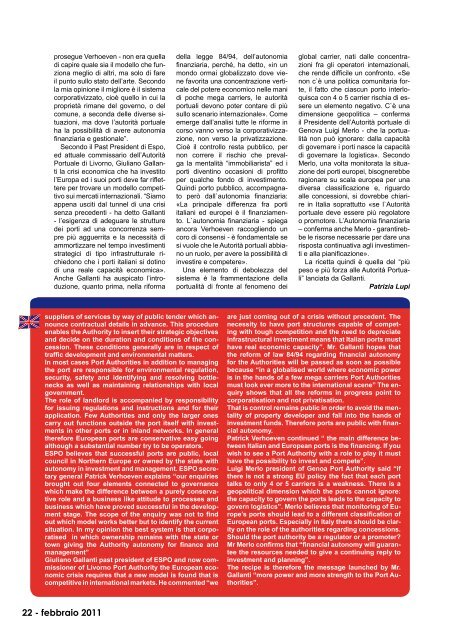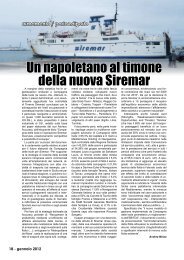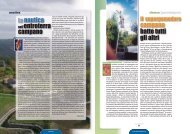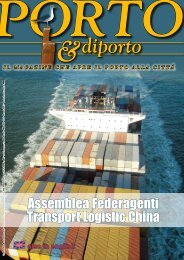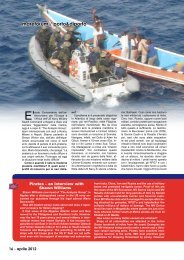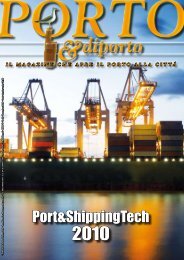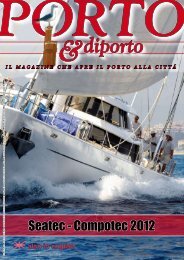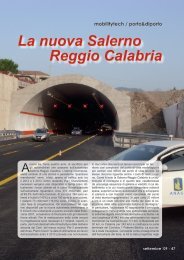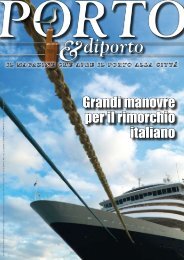Create successful ePaper yourself
Turn your PDF publications into a flip-book with our unique Google optimized e-Paper software.
prosegue Verhoeven - non era quelladi capire quale sia il modello che funzionameglio di altri, ma solo di fareil punto sullo stato dell’arte. Secondola mia opinione il migliore è il sistemacorporativizzato, cioè quello in cui laproprietà rimane del governo, o delcomune, a seconda delle diverse situazioni,ma dove l’autorità portualeha la possibilità di avere autonomiafinanziaria e gestionale”.Secondo il Past President di Espo,ed attuale commissario dell’AutoritàPortuale di Livorno, Giuliano Gallantila crisi economica che ha investitol’Europa ed i suoi porti deve far riflettereper trovare un modello competitivosui mercati internazionali. “Siamoappena usciti dal tunnel di una crisisenza precedenti - ha detto Gallanti- l’esigenza di adeguare le strutturedei porti ad una concorrenza semprepiù agguerrita e la necessità diammortizzare nel tempo investimentistrategici di tipo infrastrutturale richiedonoche i porti italiani si dotinodi una reale capacità economica».Anche Gallanti ha auspicato l’introduzione,quanto prima, nella riformadella legge 84/94, dell’autonomiafinanziaria, perché, ha detto, «in unmondo ormai globalizzato dove vienefavorita una concentrazione verticaledel potere economico nelle manidi poche mega carriers, le autoritàportuali devono poter contare di piùsullo scenario internazionale». Comeemerge dall’analisi tutte le riforme incorso vanno verso la corporativizzazione,non verso la privatizzazione.Cioè il controllo resta pubblico, pernon correre il rischio che prevalgala mentalità “immobiliarista” ed iporti diventino occasioni di profittoper qualche fondo di investimento.Quindi porto pubblico, accompagnatoperò dall`autonomia finanziaria:«La principale differenza fra portiitaliani ed europei è il finanziamento.L`autonomia finanziaria - spiegaancora Verhoeven raccogliendo uncoro di consensi - è fondamentale sesi vuole che le Autorità portuali abbianoun ruolo, per avere la possibilità diinvestire e competere».Una elemento di debolezza delsistema è la frammentazione dellaportualità di fronte al fenomeno deiglobal carrier, nati dalle concentrazionifra gli operatori internazionali,che rende difficile un confronto. «Senon c`è una politica comunitaria forte,il fatto che ciascun porto interloquiscacon 4 o 5 carrier rischia di essereun elemento negativo. C`è unadimensione geopolitica – confermail Presidente dell’Autorità portuale diGenova Luigi Merlo - che la portualitànon può ignorare: dalla capacitàdi governare i porti nasce la capacitàdi governare la logistica». SecondoMerlo, una volta monitorata la situazionedei porti europei, bisognerebberagionare su scala europea per unadiversa classificazione e, riguardoalle concessioni, si dovrebbe chiarirein Italia soprattutto «se l`Autoritàportuale deve essere più regolatoreo promotore. L’Autonomia finanziaria– conferma anche Merlo - garantirebbele risorse necessarie per dare unarisposta continuativa agli investimentie alla pianificazione».La ricetta quindi è quella del “piùpeso e più forza alle Autorità Portuali”lanciata da Gallanti.Patrizia Lupisuppliers of services by way of public tender which announcecontractual details in advance. This procedureenables the Authority to insert their strategic objectivesand decide on the duration and conditions of the concession.These conditions generally are in respect oftraffic development and environmental matters.In most cases Port Authorities in addition to managingthe port are responsible for environmental regulation,security, safety and identifying and resolving bottlenecksas well as maintaining relationships with localgovernment.The role of landlord is accompanied by responsibilityfor issuing regulations and instructions and for theirapplication. Few Authorities and only the larger onescarry out functions outside the port itself with investmentsin other ports or in inland networks. In generaltherefore European ports are conservative easy goingalthough a substantial number try to be operators.ESPO believes that successful ports are public, localcouncil in Northern Europe or owned by the state withautonomy in investment and management. ESPO secretarygeneral Patrick Verhoeven explains “our enquiriesbrought out four elements connected to governancewhich make the difference between a purely conservativerole and a business like attitude to processes andbusiness which have proved successful in the developmentstage. The scope of the enquiry was not to findout which model works better but to identify the currentsituation. In my opinion the best system is that corporatisedin which ownership remains with the state ortown giving the Authority autonomy for finance andmanagement”Giuliano Gallanti past president of ESPO and now commissionerof Livorno Port Authority the European economiccrisis requires that a new model is found that iscompetitive in international markets. He commented “weare just coming out of a crisis without precedent. Thenecessity to have port structures capable of competingwith tough competition and the need to depreciateinfrastructural investment means that Italian ports musthave real economic capacity”. Mr. Gallanti hopes thatthe reform of law 84/94 regarding financial autonomyfor the Authorities will be passed as soon as possiblebecause “in a globalised world where economic poweris in the hands of a few mega carriers Port Authoritiesmust look ever more to the international scene” The enquiryshows that all the reforms in progress point tocorporatisation and not privatisation.That is control remains public in order to avoid the mentalityof property developer and fall into the hands ofinvestment funds. Therefore ports are public with financialautonomy.Patrick Verhoeven continued “ the main difference betweenItalian and European ports is the financing. If youwish to see a Port Authority with a role to play it musthave the possibility to invest and compete”.Luigi Merlo president of Genoa Port Authority said “ifthere is not a strong EU policy the fact that each porttalks to only 4 or 5 carriers is a weakness. There is ageopolitical dimension which the ports cannot ignore:the capacity to govern the ports leads to the capacity togovern logistics”. Merlo believes that monitoring of Europe’sports should lead to a different classification ofEuropean ports. Especially in Italy there should be clarityon the role of the authorities regarding concessions.Should the port authority be a regulator or a promoter?Mr Merlo confirms that “financial autonomy will guaranteethe resources needed to give a continuing reply toinvestment and planning”.The recipe is therefore the message launched by Mr.Gallanti “more power and more strength to the Port Authorities”.22 - <strong>febbraio</strong> 2011


